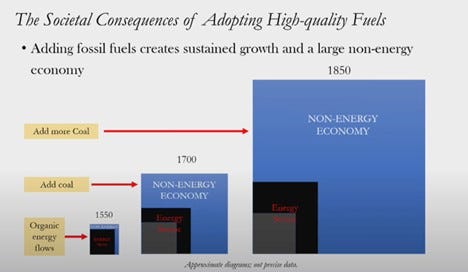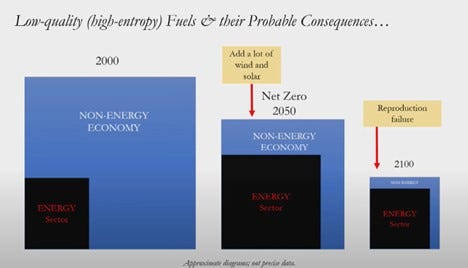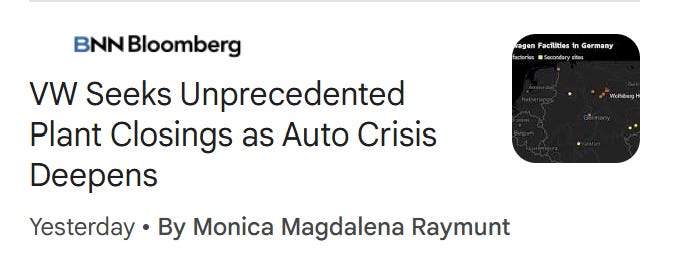What Is Wealth? Part 3: The Cost Of Everything...
...and the value of nothing. Carbon Emissions are not "All That Matters".
Introduction
In this “What is Wealth” series I am trying to describe the world by using energy, and specifically “surplus energy” as the framework for understanding society, wealth and development.
Part 1 (The Toil and the Trouble). Money is a placeholder for energy and that “wealth” is our ability to survive and flourish in the face of a natural world that would kill us.
Part 2 (Everything Comes After). Energy is the invisible foundation of societal wealth. It enables us to meet basic needs, it creates a comfortable and resilient society and liberates most of the population to pursue higher-level goals.
Part 3 (The Cost of Everything) - read on
It Just Takes The Political Will
In the Brave Net Zero World, it is not just wind turbines that blow in the wind, so does reason and logic. For many who are deeply convinced of the Net Zero energy transition, two core tenets exist:
The technology exists and “it just requires the political will” (to overcome the inertia in sunk infrastructure costs, as well as the evil Big Oil lobby)
There will be a cost - but this is a “price worth paying”
Let’s just focus on the cost. Firstly, the “price worth paying” discussion is usually based on apocalyptic visions of Hothouse Earth, which are at odds with actual climate science. It also unverifiable - make up some cost estimate for the transition, model some long-term negative climate consequences, apply a discount factor of choice and Robert is your father’s brother.
Secondly, the question of cost, and how we pay for the transition, rests on an implicit view that “the economy” will be similar, if not the better during and after the energy transition. I argue here that this is a dangerous simplification.
The False Dilemma of the Energy Transition
In an “ideal” future-world we can imagine maintaining our own societal-wealth, help create greater wealth in less fortunate geographies, reduce environmental impacts and do all this without using climate-ending fossil-fuels.
“The world that we’ll have in 2050 is extremely similar to the one we have now. We will still be flying, we’ll still be eating meat, we will still be warming our homes, just heating them differently,” he said. “The lifestyle change that goes with this is not enormous at all.” (Chris Stark - when he was CEO of the UK’s Climate Change Committee April 2024)
The meme version of this viewpoint (below) is a classic False Dilemma.
Either we have a successful Energy Transition and we solve Climate Change. Or, we have a successful Energy Transition and Climate Change didn’t need solving (the humour of the meme being embedded in the obvious ROTFL absurdity of that latter scenario).
This is a False Dilemma simply because there are other outcomes that are not considered. Both scenarios assume that all the “Green Premiums” listed on the screen are certain. But what if we don’t end up with all these promised benefits?
What if we don’t end up with all these promised “green premiums” - what if we create a worse (economic) world “for nothing” (to use the phasing of the cartoon)? Or even,
What if we create a worse (economic) world - and Anthropogenic Climate Change is real?
What worries me (scares me) the most is that many (many!) people think that the above meme represents the only possible outcomes of the “energy transition”.
The job of our department will be to deliver our mission so we can make the UK energy independent, bring down energy bills for good, create good jobs, and tackle the climate crisis. Ed Miliband - UK Secretary of State for Energy Security and Net Zero
Growing renewables is where we need to be going: they’re cheaper than fossil fuels, they don’t pollute, and they represent a huge economic opportunity. Recent estimates suggest that in a net-zero economy by 2050 scenario, jobs in the clean energy sector would grow by 2.2 million at 7% per year out to 2050. Steven Guilbeault - Canadian Minister of Environment and Climate Change
Wait, What.. its not that simple?
The entire complex debate about the Energy Transition and Net Zero policies is predicated on two arguments:
That climate change is an existential problem and the “cost of doing nothing” is much greater than the cost of making change. This is of course unprovable (it can be modelled, but such models can produce any outcome desired).
That the Net-Zero / Energy Transition will have some “upfront cost” but will ultimately result in a clean and green version of modern industrial society minus the pollution.
Obviously there are many nuances - the more Malthusian elements want degrowth and/or fewer people, but that isn’t the understanding of the middle-ground “concerned” voter. They are told that by using wind and solar, EVs and recycling it will allow for business as usual. The belief that renewables will be cheaper is deeply embedded in society and visible like a rash on social media :
The Cost of the Transition
There are many estimates of how much the Energy Transition, or Net Zero will cost - but all of these assume the economy will continue in some happy way - and that these green economies will be generating wealth - business as usual.
But as we saw in Part 1 of this series - the size and strength of the economy is a function of the surplus energy. The energy that is available to do all the invisible work over and above the work required to simply replace the energy itself. There is the “Energy Economy” - the part of the economy that gets energy (farming, mining, etc) and there is the “Non-Energy Economy” - everything else that is enabled by the Energy Economy. This latter part is now so big we have forgotten about the Energy Economy; for most of human history it wasn’t thus.
The visual representation of this I have taken as a screen-grab from an amazing video presentation by Dr John Constable. it is worth repeating here: in a subsistence economy gathering energy (in the form of food and firewood) is 90% of the economy. When a high-quality energy-dense fuel is added the Energy Economy grows a little (more energy is needed). But, the “Non-Energy” part of the economy expands much more. People (some people) can stop working in the fields and start doing trades, crafts and indeed arts. The “Surplus Energy” provided by the coal (in this example) creates the conditions for take-off. (note that this is really just an historical perspective on the importance of Energy Return on Energy Invested “EROEI/EROI”).

This becomes a massive positive feedback loop (the “1850” example above), growing the Energy Economy a little, and massively expanding the Non-Energy Economy. In many countries today - most people won’t know anyone who works in farming or oil or mining…. The Energy Economy has become all-but invisible - and this the first part of what allows people to say “Just Stop Oil” (the second part is the idea that renewables are an easy and perfect alternative).
To Infinity… And Beyond
We see models of the economy in 2050 or 2100 done with the idea of working out what the “cost” of climate change will be, or comparing to the cost of climate mitigation strategies (Net Zero) today. What these all seem to have in common is an assumption that growth is an implicit feature. Kind of doesn’t matter what we do, there will be a growing economy. I have written about this in a previous post To Infinity and Beyond, and will not repeat the arguments in detail - but any assumption about “growth” MUST have an underlying assumption about the energy economy. We must assume that we have cheap and abundant energy, because if we don’t we should see DECLINE..
Without wishing to make this post too long, it is also worth noting that many “future scenarios” simply plug in fudge-factors that suggest that future prosperous societies will simply use less energy. There is a reasonable logic to say that today’s use of fuels “waste” a lot of the Primary Energy - and what we should use as the benchmark is the “work done” or the Exergy of the system. Whilst I agree with this conceptually, it is too simplistic to just say that electrification of everything will reduce energy needs by the efficiency differential. Because electricity is so hard to store (and relatively hard to transport) additional energy is required to manage these aspects, reducing the efficiency benefits (Primary Energy and Exergy 2020).
There is a notion that there will be some “decoupling” of economic prosperity (measured usually by GDP) and energy as an input. Looking at the economy through the lens of energy, we can suggest that GDP is an output, a function of energy input. Decoupling is a whole other conversation - but it is inconceivable: GDP measures work done, work done requires energy. Decoupling is usually work being done somewhere else and not accounted for properly in GDP statistics.
Decline of the Carbon Empire
What if the energy we use is less good? What if there is less “surplus energy” (to use Dr Tim Morgan’s terminology)? Happily, John Constable has taken this extra step, going from his analysis of historical data to a thought experiment.
There are two possibly overlapping reasons that this could come to pass: (1) we are exhausting the best high-density sources, and/or (2) we chose to leave these behind and use low quality energy (wind and solar).
Using the same colour scheme as above, we see here a possible outcome of Net Zero transition to low-quality fuels. To try and put this in words, the Energy Economy (the part of the economy needed to replace the energy portion of the economy) grows. We need to “spend” more on getting the energy - in this case we can conflate money and energy and indeed people. We are spending lots of resources on getting energy - which leaves less (less finance, fewer people etc) for all other parts of the economy. Quickly this leads to a shrinking of the Non-Energy Economy because there is less surplus.
This is not business-as-usual, not stagnation, but shrinkage. Suddenly, the “cost” of the new energy becomes a MUCH BIGGER part of the overall economy. More is being used to just stand-still, and less is available for “everything else”. This is a collapse of prosperity and one that will quickly lead to an inability to recover. There will be no magic switch to flick to undo the damage. Prosperity is built gradually, decline will start slowly… but never has “gradually, then suddenly” been more apt.
In a world of finite resources, one would expect the price of a commodity to increase as the resources are used up. The easy-to-get stuff goes first and then we go after the hard-to-find. Remember this Adam Smith quote : “The real price of everything, what everything really costs to the man who wants to acquire it, is the toil and trouble of acquiring it.” ?
In a fascinating post from 2018, Gail Tverberg gives a very counter-intuitive view of macro-economics in which she discusses “diminishing returns”. The post is quite convoluted, but I read it as a description of how high commodity extraction costs will not lead to high commodity prices, but will constrain the whole economy, making everyone poorer and thus collapsing demand. This in turn means that there is price-rationing, and commodities become unaffordable unless cheap - so lower volumes because only the lowest cost production is affordable by society.
Once the economy stops growing, the whole system tends to implode… Young people find that their standards of living are lower than those of their parents. Investments do not appear to be worthwhile without government subsidies. Businesses find that economies of scale no longer work to their advantage. Pension promises become overwhelming, compared to the wages of young people. (Gail Tverberg)
Sinners and Losers
My guess is that no country will go this far, but it can be argued that some have already started down this path. I wrote Sinners and Losers - postulating that those who spurn Net Zero will be “sinners” but also “winners” whilst the Net Zero countries (losers) collapse their economies. The evidence so far is anecdotal, with a feeling of “decline” and a pervasive understanding that the “cost of living” is increasing. People are noticing that, unlike previous generations, there is little expectation that quality of life will be better for the younger generation. In the UK Prof Deiter Helm has often commented on this (and his sceptical view of Net Zero policies).
Air traffic control, school buildings, the railways, potholes in the roads, leaking water pipes, local electricity networks failing when the wind blows from the wrong direction. Why does it feel that everything in Britain is broken? (dieterhelm.co.uk)
Making energy more expensive isn’t going to fix this:
In Germany the decline is manifest as “deindustrialization” - which probably feels somewhat abstract and nebulous so far…
German industry increasingly struggles to compete on the world stage. Particularly hard hit are its mighty chemical and heavy industry sectors, which are now in rapid decline. One of the main drivers is policies that have made energy costs skyrocket, and there Germany serves as a canary in the coal mine for other leading industrial nations. (Forbes)
But is rapidly becoming very real:
In other news, the 100th anniversary of the founding of the People’s Republic of China in 2049 is purely coincidental with the West’s obsession with Net Zero by 2050.
Words vs Action
Words are powerful, indeed for many debating skills may be considered more useful than engineering because words can change opinion and modern politics is a popularity contest. Words, however, don’t change physics. Spinning a narrative that green energy will be cheaper, create millions of well-paid jobs and turbo-charge the economy is easy. Reality doesn’t care about your narrative.
Everything we know about the creation of wealth through the exploitation of affordable and reliable energy would suggest that the view that “Green Energy will create prosperity” is based on wishful thinking rather than any understanding of energy or economics.
“A small group of politicians or political voices has moved in to say that net zero is something that you can’t afford, net zero is something that you should be afraid of … But we’ve still got to reduce emissions. In the end, that’s all that matters.”
No Chris, 100% wrong, dangerously wrong.
Post Script:
I have been gestating this post for over a year now - and it feels like it is the nexus of all my writings on energy, society and the economy. As I noted elsewhere, this series of posts on “Wealth” is just me “joining the dots”, standing on the shoulders of many people who have developed these unconventional views from observations and thinking from first-principles.
Nate Hagens
John Constable
Tim Morgan
Gail Tverberg (Our Finite World)
Jean-Marc Jancovici - The Shift Project
Steve Keen (an uber-rare economist who thinks about energy as an input. His work I don’t quote directly as it is too theoretical for me, but also he has become too much of a climate alarmist for my taste)














Deep thoughts -- and the synopsis of creation of energy and its relation to creation of well-being in societies.
Well-done.
But, of course, if we just keep subsidizing everything, it will eventually all get better -- no?
And what is subsidization but an artificial construct of what society owes itself anyway? We shouldn't worry about it if the overall circular output is better, no?
(I can't quickly think of a third canard, sorry).
But real question: how serious could this ever-delayed energy transition be if every emerging city in the world (along with Cancun and Tulum) are building Taj Mahal-style airports to serve the emerging wealthy class of the 7 Billion person emerging economies? While they 'emerge', is the developed, democratic world's role to be submerging our economies?
If green energy creates jobs, that implies that more human effort is required to create green energy, and less is available for the non energy economy. It signals economic decline, not prosperity.